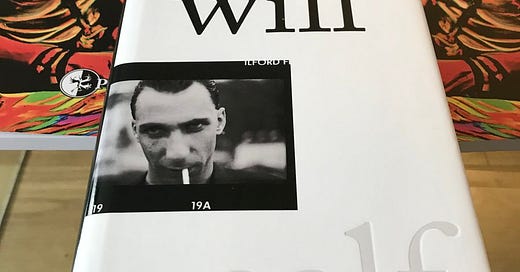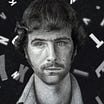This article by Roger Keen, author of The Mad Artist and The Empty Chair, appears in the Psychedelic Press journal, issue XXXVII. You can subscribe to the print issue here, or become a paid Substack subscriber for digital articles:
In his recent drug memoir, simply entitled Will, Will Self writes about himself in the third person, presumably to gain an extra measure of objectivity in what is necessarily a significant act of self-examination. Early on he says that drugs are neither a hobby nor a genre, but drug memoirs can certainly be considered as such, or at least a category—Amazon lists them under ‘Alcohol & Drug Abuse Biographies’, which includes the usual raft of celebrity confessional tomes, rubbing shoulders with the classics, such as Aldous Huxley’s The Doors of Perception: And Heaven and Hell, which, 68 years after its first publication, still sells well enough to make the top 100.
When considering other evident classics, we must include Thomas De Quincey’s Confessions of an English Opium-Eater, which arguably kick-started the genre in 1821. It influenced two other notable works, Charles Baudelaire’s Les Paradis Artificiels (1860) and Fitz Hugh Ludlow’s The Hasheesh Eater (1857). The three books are autobiographical accounts of experimentation, and very much set out the terms of debate on the positive and negative attributes of the opiates and cannabis, with the two sides forming into camps—much like with alcohol. Also worthy of mention is Aleister Crowley’s first novel, The Diary of a Drug Fiend (1922), a lightly fictionalised roman à clef that contains elements of debauchery and the picaresque, pointing towards the modern tale of drug misadventure.
Will Self uses a quote from Drug Fiend as his epigraph, and in his ‘origin story’ chapter he lists the relevant contents of his bookshelf at age seventeen. It includes De Quincey’s Confessions, alongside the indispensable Fear and Loathing in Las Vegas, and William Burroughs’s first two novels, Junky and Naked Lunch, the latter awarded to Will as a school prize! Will went on to study Politics, Philosophy and Economics at Oxford, but one senses that Burroughs, whom he calls ‘Brother Bill’, came to mean more to him than any of the great philosophers. Quotes from Burroughs are woven in throughout his memoir, forming part of a more generalised stream-of-consciousness so that only hardcore Burroughs fans will spot all of them. Burroughs’s epigrammatic wisdom seems indispensable to a young man in the late 1970s and early ’80s, speeding along the primrose path of substance abuse:
‘Whether you sniff it smoke it eat it or shove it up your ass, the result is the same: addiction.’[i]
First published in 1953—almost exactly coinciding with The Doors of Perception—Junky is a lightly fictionalised account of the author’s journey through a much wider spectrum of drugs than were hitherto available (marihuana, Benzedrine, cocaine, peyote, barbiturates and many opium derivatives—from the patent medicine paregoric to injected morphine and heroin). It has very much become the template for the modern addiction memoir in the same way as Huxley’s Doors has become the same for the modern psychedelic memoir, though the former does contain some psychedelic usage.
Will Self, as the author of many absurdist and wacky fictions, might well be expected to have a significant grounding in psychedelics, and indeed that is so, though they play only a transient role in his memoir. In that same ‘origin’ chapter, his seventeen-year-old self amasses a stash worthy of Raoul Duke’s in Fear and Loathing, and with his mate Tom and others, Will plays around with a parental rifle; and with the acid effect accelerating, he breaks through into another dimension, where there is no distinction between interior and exterior space, leading to a crazy trail-bike ride inside the house and up the Möbius stairs.[ii] And a few years later, at Oxford, Will undergoes an ‘acid-drenched summer’:
‘You don’t have to be Piranesi to fabricate such darkly fantastical visions out of reality itself—all you need is a red microdot, and the necessary head for heights, as it winches you up the hallucinogenic hill, which transmogrifies into a rollercoaster, whipping you down into a satanic cathedral, the blood-red and pulsing walls of its inverted spire lined with an infinity of mouths, all open and screaming the Bad News of your own utter annihilation…’[iii]
Self expands on this particularly hair-raising trip in an article for Prospect Magazine, reporting that he was listening to Gershwin’s Rhapsody in Blue during the peak, which engendered a hallucination of lower Manhattan complete with a marching band of corpses in various states of decay, using instruments made from human bones. But such bummerish experiences have not been ultimately depressing, he says, and that his ‘inner-space travelling’ has had benefits for his mental health. More generally, his alterations of consciousness and liberation from Huxley’s ‘reducing valve’ of the ego have given him increased biophilia, but only reinforced his philosophical perspectives of stoicism and scepticism.[iv]
However, in Self’s memoir it is heroin and its corollary addiction that inevitably comes to trump all other drugs and their effects—that pathway mapped out by Brother Bill, waiting to be trodden in Will’s different terms. Following on from a sojourn imbibing the delights of speed—providing an ‘exhilarating and useless energy’[v]—he gets to sniff some of the beige powder, and after initial nasal anguish he discovers a pleasure that elevates him into a godlike bonhomie… and this on the day that his local MP, Margaret Thatcher (Finchley constituency), assumed the role of Prime Minister.[vi] A fast-forwarding cut then takes Will to his final year at university, 1982, when he is now a seasoned user.
* * * * *
Back in 2009, when I was trying to place my own drug memoir, The Mad Artist, I exchanged correspondence with an agent who told me that it didn’t fit the required ‘template’ of the kind of drug memoir that publishers were looking for. It is primarily a psychedelic memoir, more Huxley than Burroughs, though quite Burroughsian in parts, with a plot driven by its own internal hallucinogenic phantasmagoria. What publishers wanted, apparently, was a story of initial wonder at drug effect, leading to complications and ideally some kind of breakdown—social, mental, physical, whatever—followed by a recovery where drugs are seen as malevolent and renounced, culminating in a redemptive ending.[vii] It’s a fair point, because most drug memoirs do follow that pattern, however loosely, perhaps by means of authors, editors and publishers juggling the material to fit a tried and tested brief.
The introduction to my 1971 Penguin edition of De Quincey’s Confessions states that what follows is at a total remove from modern conceptions of addiction—squalid junkies injecting with dirty needles and bivouacking in derelict buildings—but is instead a meditation on the powers of the imagination.[viii] Indeed, it does map out drug culture as a thing, a gateway to Romantic conceptions of far-flung exotic topography and exalted realms of fantasy and hypnagogia. It consolidates on Coleridge’s ‘Xanadu’, with its pleasure-dome and measureless caverns, and it abounds with detailed descriptions of expanded perceptions of time and space, and journeys of impossible height and depth in human apprehension. Imbibing such passages, the modern reader can’t help but notice how similar—if not entirely congruent—they are to psychedelic trip accounts.
But inevitably Confessions is a tale of two halves, and the pleasures of opium are followed by its pains—the wretchedness of the addict’s life and the ruination of superior, more sober possibilities. Inevitably, after an agonising struggle, renunciation of the substance arrives on the final page, the only way forward.[ix] So, that formula the literary agent described is present and correct in the first ever drug memoir of note, and within it De Quincey achieves three things: firstly the opening of an arcane treasure box of delights; secondly issuing a dire warning of the perils of going there; and thirdly performing a covert nudge-wink, because axiomatically the author hasn’t followed this recommended path—and indeed De Quincey was criticised for not making more of the downside, whilst over-promoting the other.
Inspired by De Quincey, French poet Charles Baudelaire, a member of the ‘Club des Hashischins’, penned his own narcotic meditation ‘Du Vin et du Hachish’, which was later expanded into Les Paradis Artificiels, to include opium. When it comes to hashish, Baudelaire approaches the experience didactically, advising on set and setting, recommending favourable circumstances and pleasant surroundings. ‘Every delight, every contentment is magnified, and every pain, every anguish, is intensely and sharply felt,’ he tells us.[x] In tandem, fellow poet and club member Théophile Gautier gave us early examples of full-blown trip lit:
‘My body seemed to dissolve until it became completely transparent […] My eyelashes lengthened immeasurably and wrapped, like gold threads, around a small ivory spindle which then began to spin with astonishing speed. Shimmering cascades of multi-coloured gemstones, arabesques and flowers presented themselves in endless succession, in effects which I can only compare to those of a kaleidoscope…’[xi]
But Baudelaire doesn’t hold back on the negative aspects, warning of the indolence that follows hashish indulgence and condemning a substance that can endow so much apparent bounty without any work being done in return.[xii]
Another devotee of De Quincey, American Fitz Hugh Ludlow, produced the Confessions-like memoir The Hasheesh Eater, which effectively applies De Quincey’s methods to describing heroic-dose trips using tincture of cannabis. Both men were classical scholars firmly embedded in the Romantic tradition, and so that same luxuriant imagery of antiquity is projected onto the experience, though with Ludlow it seemingly escalated to full immersion in hallucinatory worlds. After initial fright on his first trip, involving a visit to a doctor to confirm he isn’t dying,[xiii] Ludlow settles into a grove of wonderment, which sustains over a number of sessions, the splendiferous journeys minutely and lovingly rendered in unrestrained florid prose…





